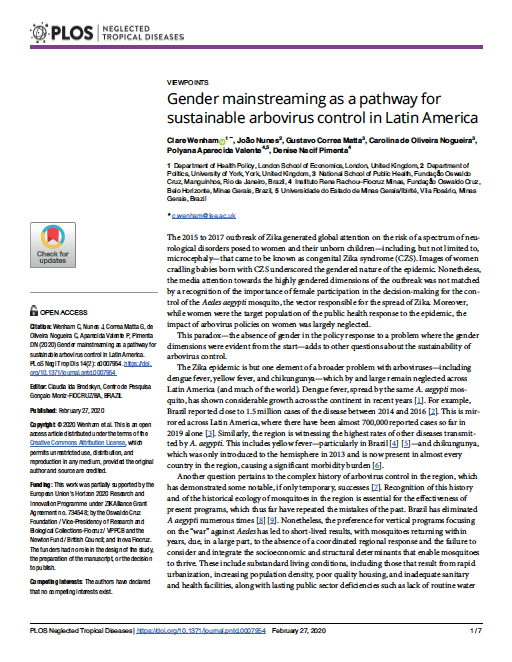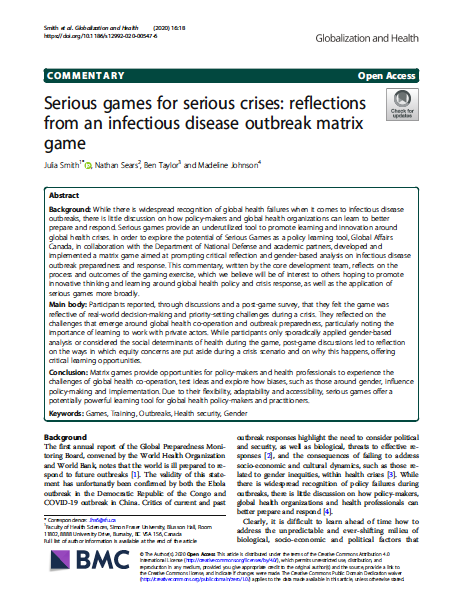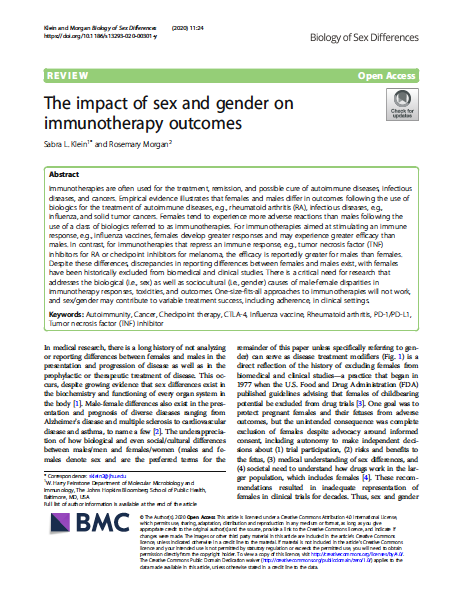Resources
![]()
This is a collection of resources from the Gender and Public Health Emergencies project and the Gender Working Group. You can search by year, country and type of resource. We hope you will enjoy reading this growing body of knowledge from around the world.
We have a wider collection of Gender and COVID-19 resources in this google document which is curated by Rosemary Morgan.
The 2015 to 2017 outbreak of Zika generated global attention on the risk of a spectrum of neurological disorders posed to women and their unborn children—including, but not limited to, microcephaly—that came to be known as congenital Zika syndrome (CZS). Images of women cradling babies born with CZS underscored the gendered nature of the epidemic. […]
While there is widespread recognition of global health failures when it comes to infectious disease outbreaks, there is little discussion on how policy-makers and global health organizations can learn to better prepare and respond. Serious games provide an underutilized tool to promote learning and innovation around global health crises. In order to explore the potential […]
Immunotherapies are often used for the treatment, remission, and possible cure of autoimmune diseases, infectious diseases, and cancers. Empirical evidence illustrates that females and males differ in outcomes following the use of biologics for the treatment of autoimmune diseases, e.g., rheumatoid arthritis (RA), infectious diseases, e.g., influenza, and solid tumor cancers. Females tend to experience […]
Gender is often neglected in health systems, yet health systems are not gender neutral. Within health systems research, gender analysis seeks to understand how gender power relations create inequities in access to resources, the distribution of labour and roles, social norms and values, and decision-making. This paper synthesises findings from nine studies focusing on four […]
Brazil’s Zika virus crisis (2015–17), following hot on the heels of the Ebola outbreak (2014–15), dominated newsfeeds and high-level discussions amid governments, the UN system and beyond, with emerging fears relating to Congenital Zika Syndrome (CZS), embodied by microcephaly. However, beyond the ensuing panic in Latin America facing a generation of Zika babies, the outbreak […]
The Zika outbreak provides pertinent case study for considering the impact of health emergencies on abortion decision-making and/or for positioning abortion in global health security debates. This paper provides a baseline of contemporary debates taking place in the intersection of two key health policy areas, and seeks to understand how health emergency preparedness frameworks and […]
Males/men and females/women differ in the outcome of influenza A virus (IAV) infections, vaccination, and antiviral treatments. Both sex (i.e. biological factors) and gender (i.e. sociocultural factors) can impact exposure and severity of IAV infections as well as responses and outcomes of treatments for IAV. Greater consideration of the combined effects of sex and gender […]
In this paper, a case is made for mainstreaming gender into global women’s health programming and policies. The potential implications of conflating “gender” with “women'” in the design and evaluation of women’s health programming are first considered. HIV/AIDS case studies are then used to depict examples of (a) where gender has been well integrated and […]
Socio-economic factors are widely believed to have been an important driver of the transmission of Ebola Virus Disease (EVD) during the West African outbreak of 2014–16, however, studies that have investigated the relationship between socio-economic status (SES) and EVD have found inconsistent results. Using nationally representative household survey data on whether respondents knew a close […]
Globally gender remains a key factor in differing health outcomes for men and women. This article analyses the particular relevance of gender for debates about global health and the role for international human rights law in supporting improved health outcomes during public health emergencies. Looking specifically at the recent Ebola and Zika outbreaks, what we […]
Resources
![]()
This is a collection of resources from the Gender and COVID-19 project and the Gender Working Group. You can search by year, country and type of resource. We hope you will enjoy reading this growing body of knowledge from around the world.
We have a wider collection of Gender and COVID-19 resources in this google document which is curated by Rosemary Morgan.
The 2015 to 2017 outbreak of Zika generated global attention on the risk of a spectrum of neurological disorders posed to women and their unborn children—including, but not limited to, microcephaly—that came to be known as congenital Zika syndrome (CZS). Images of women cradling babies born with CZS underscored the gendered nature of the epidemic. […]
While there is widespread recognition of global health failures when it comes to infectious disease outbreaks, there is little discussion on how policy-makers and global health organizations can learn to better prepare and respond. Serious games provide an underutilized tool to promote learning and innovation around global health crises. In order to explore the potential […]
Immunotherapies are often used for the treatment, remission, and possible cure of autoimmune diseases, infectious diseases, and cancers. Empirical evidence illustrates that females and males differ in outcomes following the use of biologics for the treatment of autoimmune diseases, e.g., rheumatoid arthritis (RA), infectious diseases, e.g., influenza, and solid tumor cancers. Females tend to experience […]
Gender is often neglected in health systems, yet health systems are not gender neutral. Within health systems research, gender analysis seeks to understand how gender power relations create inequities in access to resources, the distribution of labour and roles, social norms and values, and decision-making. This paper synthesises findings from nine studies focusing on four […]
Brazil’s Zika virus crisis (2015–17), following hot on the heels of the Ebola outbreak (2014–15), dominated newsfeeds and high-level discussions amid governments, the UN system and beyond, with emerging fears relating to Congenital Zika Syndrome (CZS), embodied by microcephaly. However, beyond the ensuing panic in Latin America facing a generation of Zika babies, the outbreak […]
The Zika outbreak provides pertinent case study for considering the impact of health emergencies on abortion decision-making and/or for positioning abortion in global health security debates. This paper provides a baseline of contemporary debates taking place in the intersection of two key health policy areas, and seeks to understand how health emergency preparedness frameworks and […]
Males/men and females/women differ in the outcome of influenza A virus (IAV) infections, vaccination, and antiviral treatments. Both sex (i.e. biological factors) and gender (i.e. sociocultural factors) can impact exposure and severity of IAV infections as well as responses and outcomes of treatments for IAV. Greater consideration of the combined effects of sex and gender […]
In this paper, a case is made for mainstreaming gender into global women’s health programming and policies. The potential implications of conflating “gender” with “women'” in the design and evaluation of women’s health programming are first considered. HIV/AIDS case studies are then used to depict examples of (a) where gender has been well integrated and […]
Socio-economic factors are widely believed to have been an important driver of the transmission of Ebola Virus Disease (EVD) during the West African outbreak of 2014–16, however, studies that have investigated the relationship between socio-economic status (SES) and EVD have found inconsistent results. Using nationally representative household survey data on whether respondents knew a close […]
Globally gender remains a key factor in differing health outcomes for men and women. This article analyses the particular relevance of gender for debates about global health and the role for international human rights law in supporting improved health outcomes during public health emergencies. Looking specifically at the recent Ebola and Zika outbreaks, what we […]















